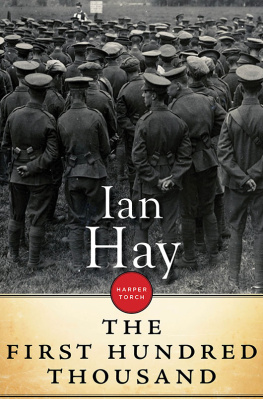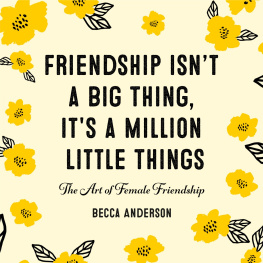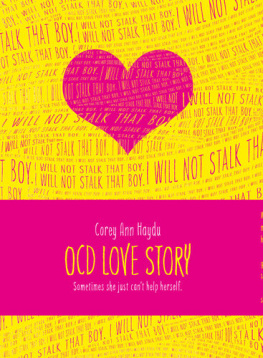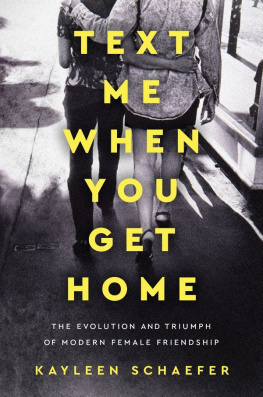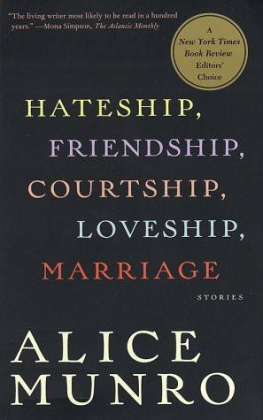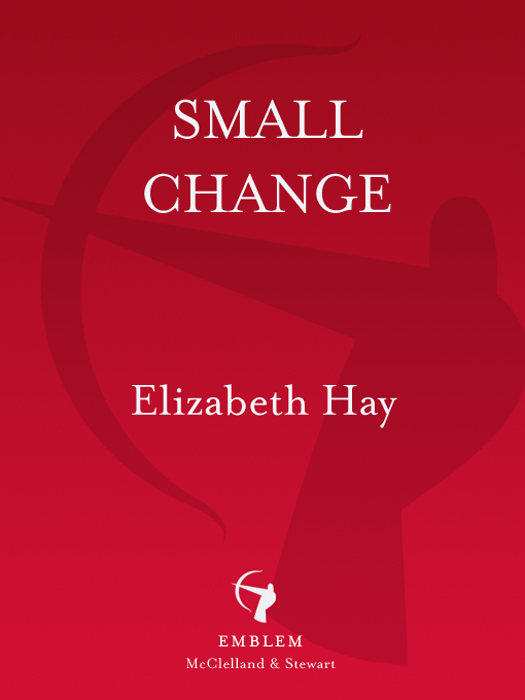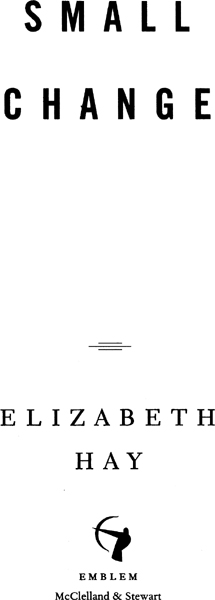PRAISE FOR
Small Change
Tightly sprung stories, beautifully balanced, and eminently re-readable.
Quill & Quire
This exceptional, well-paced collection of linked stories about womens friendships has an extraordinarily intimate feel thats propelled by the readers sense that he or she has either known or been the woman Hay portrays.
Booklist
Beautiful, insightful studies of women and friendship.
Vancouver Sun
Hay brings together in [Small Change] the revelatory power of narrative, the analytical possibilities of the personal essay and memoir, the investigative discipline of journalism, and the sudden illumination of lyric, and as a result she seems able to pick up almost everything everything said, and most of what is only whispered in a gesture or a look between friends. Endlessly rewarding. These stories are beautifully written and carefully honed.
Malahat Review
Hay knows how to make a line breathe, and its possible to open the book at random to find sharp, almost electric, prose leap out and give off light. Through sparkling prose, Hay is able to flesh out the quirky and individual gestures that make out relationships.
Ottawa X Press
A collection about one womans friends and acquaintances, linked like so many pearls of wisdom on strands of razor wire With its masterfully crafted tonalities, this analysis of friendship has a dark urgency thats as instructive as it is unsettling.
Kirkus Reviews
In spare prose, the stories exert a quiet forcefulness and convey a sense of character, message, and plot without pretense or superficiality. A gifted storyteller, Hay has written a wise, penetrating, and memorable collection of stories that communicates the vulnerable nature of friendship.
Library Journal
Stories that capture those details, moments, that someone less observant, less sensitive would miss. Language that flows as easily as water.
Jury citation, Governor Generals Literary Awards
Hay knows the dirt roads of the heart like her own back yard.
Canadian Book Review Annual
One of Canadas premier writers.
Canadian Forum
This book is for my mother, my daughter,
and Sheila McCook
Her failure lay within herself, in her abrupt pride, and sudden sharp intolerance, and her inability, when in certain moods, to accept the small change of friendship, even from those who she knew loved her deeply.
Nol Coward, Present Indicative
You have to be clever to figure out how to be welcoming and defensive at the same time.
Toni Morrison, Jazz
CONTENTS
The Friend

S he was thirty, a pale beautiful woman with long blond hair and high cheekbones, small eyes, sensuous mouth, an air of serenity and loftiness superiority and under that, nervousness, insecurity, disappointment. She was tired. There was the young child who woke several times a night. There was Danny who painted till two in the morning, then slid in beside her and coaxed her awake. There was her own passivity. She was always willing, even though she had to get up early, and always resentful, but never out loud. She complied. In conversation she was direct and Danny often took part, but in bed, apparently, she said nothing. She felt him slide against her, his hand between her legs, its motion the reverse of a woman wiping herself, back to front instead of front to back. She smelled paint the air of the poorly ventilated attic where he worked and felt his energetic weariness and responded with a weary energy of her own.
He didnt speak. He didnt call her by any name (during the day he called her Moe more often than Maureen). He reached across her and with practised efficiency found the Vaseline in the bedside drawer.
I met her one afternoon on the sidewalk outside the neighbourhood grocery store. It was sunny and it must have been warm a Saturday in early June. Our section of New York was poor and Italian, and we looked very different from the dark women around us. The friendship began with that shorthand shortcut to each other an understanding that goes without saying. I had a small child too.
A week later, at her invitation, I walked the three blocks to her house and knocked on the front door. She opened a side door and called my name. Beth, she said, this way. She was dressed in a loose and colourful quilted top and linen pants. She looked composed and bohemian and from another class.
Inside there was very little furniture: a sofa, a chest, a rug, Dannys paintings on the wall. He was there. A small man with Fred Astaires face and an ingratiating smile. Once he started to talk, she splashed into the conversation, commenting on everything he said and making it convoluted out of what I supposed was a desire to be included. Only later did I realize how much she insisted on being the centre of attention, and how successfully she became the centre of mine.
We used to take our kids to the only playground within walking distance. It was part of a school yard that marked the border between our neighbourhood and the next. The pavement shimmered with broken glass, the kids were wild and unattended. We pushed our two on the swings and kept each other company. She said she would be so mad if Danny got AIDS , and I thought about her choice of words -so mad struck by the understatement.
I learned about sex from her the way girls learn about sex from each other. In this case the information came not in whispered conversations behind a hedge, but more directly and personally than anything I might have imagined at the age of twelve. In those days the hedge was high and green and the soil below it dark, a setting at once private, natural, and fenced off. This time everything was in the open. I was the audience, the friend with stroller, the mild-mannered wide-eyed listener who learned that breastfeeding brought her to the point of orgasm, that childbirth had made her vagina sloppy and loose, that anal sex hurt so much she would sit on the toilet afterwards, bracing herself against the stabs of pain.
We were in the playground (that sour, overused, wrongly used, hardly playful patch of pavement) and she said she was sore and told me why. When I protested on her behalf she said, But I might have wanted it. I dont know. I think I did want it in some way.
I cant remember her hands, not here in this small cool room in another country and several years after the fact. I remember watching her do many things with her hands; yet I cant remember what they looked like. They must have been long, slender, pale unless tanned. But they dont come to mind the way a mans might and I suppose thats because she didnt touch me. Or is it because I became so adept at holding her at bay? I remember her lips, those dry thin Rock Hudson lips.
One evening we stood on the corner and she smiled her fleeting meaningful smiles, looking at me with what she called her northern eyes (they were blue and she cried easily) while her heartbreak of a husband put his arm around her. What will become of her, I wondered, even after I found out.
She was standing next to the stove and I saw her go up in flames: the open gas jets, the tininess of the room, the proximity of the children standing on chairs by the stove and her hair. It slid down her front and fell down her back. She was making pancakes that were obviously raw. She knew they were raw, predicted they would be, yet did nothing about it. Nor did I. I just poured on lots of syrup and said they were good.




